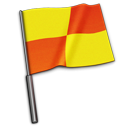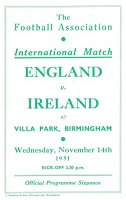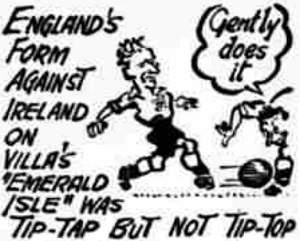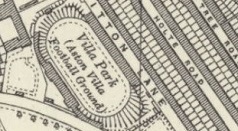|
"My memory of that match is of being frightened out of
my life. Somebody threw a firework onto the pitch in the
second half, and it sounded like a gunshot. It was the sort of
thing you expect when playing in South America, but this was
pretty near unheard of in an English ground. Like the rest of
the players, I jumped out of my skin. There was the hilarious
sight of all the photographers behind the goal throwing
themselves to the ground."
- Billy Wright |
|
|
|
flg.jpg)  "ENGLAND
WIN—BUT STOCK STILL SLUMPS"
Birmingham Gazette "ENGLAND
WIN—BUT STOCK STILL SLUMPS"
Birmingham Gazette |
  Officials
from Wales Officials
from Wales |
England |
UK ruling on substitutes |
Ireland |
Referee (black)
Benjamin
Mervyn
Griffiths
42 (17 January 1909), Abertillery, Monmouthshire |
|
|
red flag
Linesmen
yellow flag |
F. Owen
Llay |
F. Roberts
Bangor |
|
|
|
flg.jpg) England
Team England
Team |
| |
|
Rank |
No official ranking system established;
ELO rating 5th to 4th |
Colours |
The 1949 home
uniform -
White collared jerseys, blue shorts, red socks.
|
|
P 21st of 43, W 13 - D 3 - L 5 - F
58 - A 31. |
|
Captain |
Billy Wright
|
Manager |
Walter Winterbottom, 38 (31 March 1913), appointed as FA national director of coaching/team manager on 8 July 1946; |
 ³
23rd of 90, W 15 - D 2 - L 6 - F 57 - A 28. ³
23rd of 90, W 15 - D 2 - L 6 - F 57 - A 28. |
Trainer: Hubert Bourne (Aston Villa FC) |
P 41st of 139, W 28 - D 6 - L 7 - F 126 - A 47. |
|
|
overtakes Bob Compton's
record |
Team chosen by Selection Committee headed by Arthur Drewry,
on Monday, 5 November. |
flg.jpg) England
Lineup England
Lineup |
|
|
three changes
to the previous match
(Merrick, Sewell & Phillips>Williams, Thompson & Baily) |
league position
(5 November) |
|
|
73 |
|
Merrick, Gilbert H. |
29
292 days |
26 January 1922 |
G |
Birmingham City FC
(FL2 13th) |
1 |
0ᵍᵃ |
|
710 |
the ninth City player to represent
England |
|
2 |
Ramsey, Alfred E. |
31
296 days |
22 January 1920 |
RB |
Tottenham Hotspur FC
(FL 3rd) |
17 |
0 |
|
3 |
Smith, Lionel |
31
83 days |
23 August 1920 |
LB |
Arsenal FC
(FL TOP) |
3 |
0 |
|
4 |
Wright, William A. |
27
281 days |
6 February 1924 |
RHB |
Wolverhampton
Wanderers FC (FL
12th) |
38 |
3 |
|
5 |
Barrass, Malcolm W. |
26
336 days |
13 December 1924 |
CHB |
Bolton Wanderers FC
(FL 4th) |
2 |
0 |
|
6 |
Dickinson, James W. |
26
204 days |
24 April 1925 |
LHB |
Portsmouth
FC (FL 5th) |
15 |
0 |
7
 |
Finney,
Thomas |
29
223 days |
5 April 1922 |
OR |
Preston
North End FC (FL 6th) |
35 |
20 |
|
711 |
8 |
Sewell, John |
24
294 days |
24 January 1927 |
IR |
Sheffield Wednesday FC
(FL2 5th) |
1 |
0 |
|
the 31st Wednesday player to represent
England |
9
  |
Lofthouse, Nathaniel |
26
79 days |
27 August 1925 |
CF |
Bolton Wanderers FC
(FL 4th) |
3 |
4 |
|
the
157th (24th post-war) brace scored |
|
712 |
10 |
Phillips, Leonard H. |
29
64 days |
11 September 1922 |
IL |
Portsmouth FC
(FL 5th) |
1 |
0 |
|
the tenth Portsmouth player to represent
England |
|
11 |
Medley, Leslie D. |
31
72 days |
3 September 1920 |
OL |
Tottenham Hotspur FC
(FL 3rd) |
5 |
1 |
|
reserves: |
Bill Nicholson (Tottenham Hotspur FC
(FL 3rd)) and
Stan Pearson (Manchester United FC
(FL 2nd)) |
|
team notes: |
Merrick becomes the fourth goalkeeper from Birmingham City, following
Chris Charsley (1893),
Dan Tremelling (1928) and
Harry Hibbs
(1930-36).
The three
debutants took the total of players used by Walter Winterbottom, under
ISC's jurisdiction, to 61. |
|
venue notes: |
Nat Lofthouse becomes just the second player to score two goals at
this venue, after Jimmy Settle did it at the old
Aston Lower Grounds site 1899-1902. |
|
The team set up in Leamington Spa prior to the match,
using the Leamington Lockheed FC ground to train on. |
|
|
|
2-3-5 |
Merrick -
Ramsey, Smith -
Wright, Barass, Dickinson -
Finney, Sewell, Lofthouse, Phillips, Medley |
|
Averages: |
Age |
28 years 237
days |
Appearances/Goals |
11.0 |
2.4 |
|
|
|
 Ireland
Team Ireland
Team |
| |
|
Rank |
No official ranking system established;
ELO rating 49th |
Colours |
Green jerseys, white shorts, blue socks. |
|
Captain |
Jack Vernon |
Manager |
Peter Dermot Doherty, 38 (5 June 1913),
appointed October 1951, also player-manager at Doncaster Rovers FC since
June 1949.
Team chosen on Monday, 5 November 1951.
|
|
second match, W 0 - D - 0 - L 2 - F 0 - A 5 |
 Ireland
Lineup Ireland
Lineup |
|
|
Uprichard, W.
Norman M. |
23
208 days |
20 April 1928 |
G |
Swindon Town FC, England |
2 |
5ᵍᵃ |
|
2 |
Graham, W.G. Leonard |
26
28 days |
17 October 1925 |
RB |
Doncaster Rovers FC, England |
4 |
0 |
|
3 |
McMichael, Alfred |
24
44 days |
1 October 1927 |
LB |
Newcastle United FC, England |
7 |
0 |
|
4 |
Dickson, William |
28
244 days |
15 March 1923 |
RHB |
Chelsea FC, England |
4 |
0 |
|
5 |
Vernon, John
J. |
33
49 days |
26 September 1918 |
CHB |
West Bromwich Albion FC, England |
17 |
0 |
|
also has two appearances for Éire |
final app
1946-51 |
|
6 |
McCourt, Francis J. |
25
340 days |
9 December 1925 |
LHB |
Manchester City FC, England |
1 |
0 |
|
7 |
Bingham, William L. |
20
101 days |
5 August 1931 |
OR |
Sunderland AFC, England |
3 |
0 |
|
8 |
Smyth, Samuel |
26
262 days |
25 February 1925 |
IR |
Stoke City FC, England |
9 |
5 |
|
final app
1947-51 |
|
9 |
McMorran,
Edward J. |
28
73 days |
2 September 1923 |
CF |
Barnsley FC, England |
6 |
1 |
|
10 |
McIlroy, James |
20
20 days |
25 October 1931 |
IL |
Burnley FC, England |
2 |
0 |
|
11 |
McKenna, John |
25
161 days |
6 June 1926 |
OL |
Huddersfield Town AFC, England |
7 |
0 |
|
final app
1949-51 |
|
reserve: |
Danny
Blanchflower (Aston Villa FC) |
|
team changes: |
Bertie Peacock (Rangers FC) was the original chosen inside-left, his
place going to McIlroy on 9 November after Peacock twisted his knee. |
|
Manager Peter Doherty played for Ireland against England on seven
separate occasions from 1935 until 1947, scoring one in 1947. |
|
The Ireland team were also set up in Leamington Spa before this match. |
|
|
|
2-3-5 |
Uprichard -
Graham, McMichael -
Dickson, Vernon, McCourt
-
Bingham, Smyth, McMorran, McIlroy, McKenna |
|
Averages: |
Age |
25 years 240
days |
Appearances/Goals |
5.6 |
0.5 |
|
|
|
|
Match Report by
Mike Payne |
|
 With
Scotland surprisingly losing at home to Wales this win proved very
important in the race for the Home International Championship. Once again,
though, it was a poor performance by England and indeed, a poor game
overall. With
Scotland surprisingly losing at home to Wales this win proved very
important in the race for the Home International Championship. Once again,
though, it was a poor performance by England and indeed, a poor game
overall.
With both defences well-organised all the forwards found it hard to make
headway. Nat Lofthouse was the most dangerous of the England players and
in one of the rare first-half attacking moves he almost scored. A fine crossfield pass by Len Phillips sent Tom Finney away and split the Irish
defence wide open. Finney's pass found Lofthouse and only a desperate dive
by Uprichard at the big centre-forward's feet saved the day. England's
only other worthwhile attack of the half brought them a goal.

A fine move from Phillips to Lofthouse, square to Jackie Sewell, back to
Lofthouse, on to Finney, and a centre into the middle met by a crashing
header from Lofthouse again.
The goal brought hope for a better
second half but, alas, the game never got any better, Both Sewell and
Phillips were a little predictable in their play and only three moments in
the second half warranted a mention.
McMorran was
unlucky with Northern Ireland's best effort of the match when his
tremendous 25-yard shot crashed
against the angle of the post and the crossbar after he beat Malcolm Barass,
not for the first time.
The second moment was when a firework went
off surprising a touch-line photographer, much to the crowd's amusement.
The final highlight gave England their second and decisive goal. It came
thanks to a bad mistake by Uprichard seven minutes from the end. A
harmless looking centre from Sewell was dropped by the goalkeeper straight
to the feet of the lurking Lofthouse and before you could say his name the ball
was in the back of the net to make it 2-0.
|
|
Match Report by
Norman Giller |
|
.jpg) The selectors experimented by giving
inside-forwards Jackie Sewell and Len Phillips their first caps either
side of Nat Lofthouse, who scored a goal in each half. Birmingham City
goalkeeper Gil Merrick made the short journey to Villa Park for his first
of twenty-three caps.
He kept a clean sheet, but was lucky in the second half when a
screaming twenty-five yard shot from Barnsley forward Eddie McMorran crashed
against the crossbar. Billy Wright gave a vintage performance. He was the boss
both of the defence and the midfield. His tackles were panther-like in their
speed, and then he always found a team-mate with a well judged pass. The selectors experimented by giving
inside-forwards Jackie Sewell and Len Phillips their first caps either
side of Nat Lofthouse, who scored a goal in each half. Birmingham City
goalkeeper Gil Merrick made the short journey to Villa Park for his first
of twenty-three caps.
He kept a clean sheet, but was lucky in the second half when a
screaming twenty-five yard shot from Barnsley forward Eddie McMorran crashed
against the crossbar. Billy Wright gave a vintage performance. He was the boss
both of the defence and the midfield. His tackles were panther-like in their
speed, and then he always found a team-mate with a well judged pass.
|
|
Match Report
as appears in the F.A. Yearbook 1952-53, pages 25 & 26 |
|
.jpg) When
England met Ireland at Villa Park on November 14th three changes were made
from the team that met Wales, Sewell and Phillips taking the
inside-forward positions, whilst Merrick replaced Williams in goal.
Although it looked well enough on paper, and was the same side that
effectively against the Scottish League, the England attack was scrappy
and disappointing. Ireland fielded a better team than she had for a number
of years, and as the only two goals of the match were the result of
mistakes by the Irish defence, it might have been anyone's match. When
England met Ireland at Villa Park on November 14th three changes were made
from the team that met Wales, Sewell and Phillips taking the
inside-forward positions, whilst Merrick replaced Williams in goal.
Although it looked well enough on paper, and was the same side that
effectively against the Scottish League, the England attack was scrappy
and disappointing. Ireland fielded a better team than she had for a number
of years, and as the only two goals of the match were the result of
mistakes by the Irish defence, it might have been anyone's match.
In
the first half Medley looked dangerous, but the ball tended to be pushed
down the middle. Finney, too, on the other wing received very useful
passes. The first goal came just before half-time, when, following a spasm
of brilliant inter-passing with Sewell and Finney, Lofthouse headed the
ball into an undefended goal. The English goal was left for the most part
unmolested, though a fine shot from McMorran, Ireland's centre-forward,
struck the post from 25 yards. Lofthouse also scored England's second goal
when Uprichard, the Irish goalkeeper, dropped a centre from Sewell right
at his feet.
|
In
Other News....
|
It was on 14
November 1951 that the inquest into the death at
Whitstable, two days earlier, of 18-year-old Private William
Hazelden of the Royal Sussex Regiment reached a verdict of
accidental death. The young soldier had run away from his
training at Canterbury and was hiding in a haystack when
65-year-old George Foreman shot him in mistake for a fox.
The coroner said that it was gross negligence on the part of
Foreman in that he did not know that it was a fox and
advised him to never use his gun again. |
|
|
|
|
International
Football Results
(14 November 1951) |
|
Home International Championship:
Scotland 0
Wales 1
Hampden Park, Glasgow
(71,272)
Allchurch |
|
Scotland's Tommy Orr hit the post from an
eighth-minute penalty and their hopes of retaining the
championship took a huge blow when Ivor Allchurch headed in the
winner in the last minute. |
|
|
|
|
|
Home International Championship Table |
|
Team |
P |
W |
D |
L |
F |
A |
₧
|
|
England |
2 |
1 |
1 |
0 |
3 |
1 |
3 |
|
Wales |
2 |
1 |
1 |
0 |
2 |
1 |
3 |
|
Scotland |
2 |
1 |
0 |
1 |
3 |
1 |
2 |
|
Ireland |
2 |
0 |
0 |
2 |
0 |
5 |
0 |
|
|
|
|
|
|
|
Source Notes |
TheFA.com
Original newspaper reports
Northern Ireland's Football Greats |
|
Rothman's Yearbooks
Mike Payne's England: The Complete Post-War Record
Norman Giller, Football Author
British Pathé |
|
|
cg |

.jpg)



.jpg) The selectors experimented by giving
inside-forwards Jackie Sewell and Len Phillips their first caps either
side of Nat Lofthouse, who scored a goal in each half. Birmingham City
goalkeeper Gil Merrick made the short journey to Villa Park for his first
of twenty-three caps.
The selectors experimented by giving
inside-forwards Jackie Sewell and Len Phillips their first caps either
side of Nat Lofthouse, who scored a goal in each half. Birmingham City
goalkeeper Gil Merrick made the short journey to Villa Park for his first
of twenty-three caps..jpg) When
England met Ireland at Villa Park on November 14th three changes were made
from the team that met Wales, Sewell and Phillips taking the
inside-forward positions, whilst Merrick replaced Williams in goal.
Although it looked well enough on paper, and was the same side that
effectively against the Scottish League, the England attack was scrappy
and disappointing. Ireland fielded a better team than she had for a number
of years, and as the only two goals of the match were the result of
mistakes by the Irish defence, it might have been anyone's match.
When
England met Ireland at Villa Park on November 14th three changes were made
from the team that met Wales, Sewell and Phillips taking the
inside-forward positions, whilst Merrick replaced Williams in goal.
Although it looked well enough on paper, and was the same side that
effectively against the Scottish League, the England attack was scrappy
and disappointing. Ireland fielded a better team than she had for a number
of years, and as the only two goals of the match were the result of
mistakes by the Irish defence, it might have been anyone's match.